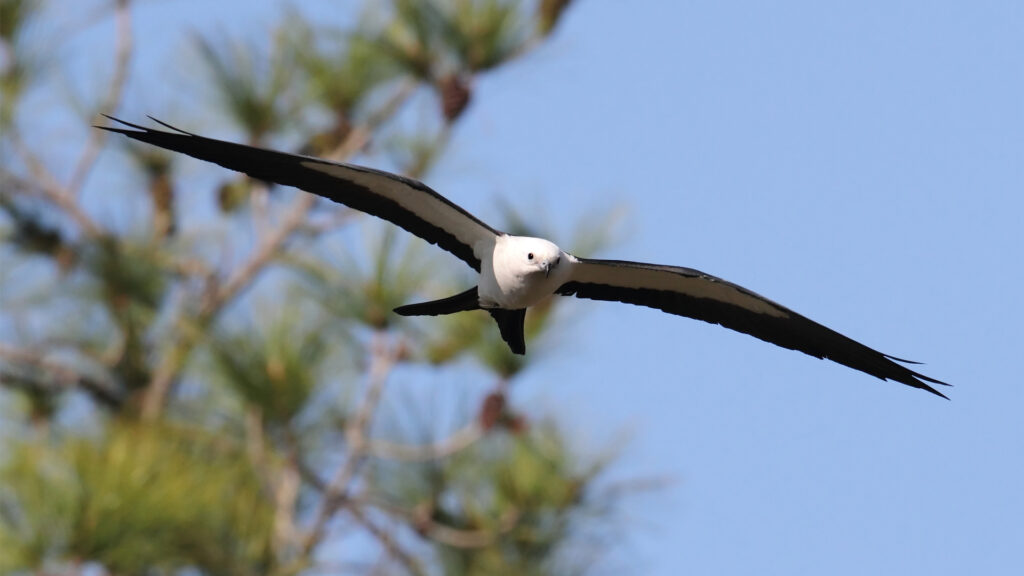By Mia McCormick, Environment Florida
“Look, Mom, that bird has a shark’s tail!” My 9-year-old son pointed to a pair of large black-and-white birds circling a patch of woods near our home. Three other neighborhood children looked up and echoed his observation excitedly. I was tickled at the opportunity to introduce them to the migratory swallow-tailed kite.
Observers can easily identify the unique “V” shape of a swallow-tailed kite when the bird is soaring high above Florida’s forests and swamps. Each March, visitors to the Gulf Coast near Corkscrew Swamp Audubon Sanctuary know that warmer weather is on its way when the kites return from wintering in Brazil and Argentina.
Kites are an important part of Florida’s ecosystem, even if they’re not year-round residents. These birds spread seeds, pollinate plants, attract birdwatchers and capture the imagination of children hoping to spot the transient “shark-bird.”

Migratory birds’ dependence on multiple habitats makes them uniquely vulnerable to disruptions, such as deforestation or habitat loss through development. Americans have long loved watching the arrival of migratory birds like kites, scarlet tanagers with their bright flashes of color, warblers with their soothing songs, cedar waxwings showing off with their acrobatic flight and wood ducks.
These are among several billion migratory birds that travel long distances each year, impacting the ecology of many regions in their travels. Despite the value they bring, about 29% of all North American birds disappeared over the past 50 years.
We can give these birds more than a wing and a prayer. The U.S. House of Representatives recently passed the Migratory Birds of the Americas Conservation Enhancements Act, sponsored by Rep. Maria Salazar (R-FL) The bipartisan bill will enhance the Neotropical Migratory Birds Conservation Act, which funds habitat conservation with grants for efforts that cross national borders to aid migratory species. These acts fund research, monitoring and education programs.
Over the past 20 years, the U.S. has invested about $80 million in grants to more than 650 migratory bird projects in dozens of countries. It’s impossible to know how many species it has saved by protecting habitats in places such as Costa Rica or Mexico, stops along many birds’ migratory routes.
Now, Sens. Ben Cardin (D-MD) and John Boozman (R-AR) have introduced a bipartisan Senate version of the bill that urgently needs support. A report by the United Nations World Economic Forum says that 40% of migratory species are in decline, with 20% likely to go extinct. This looming decline in biodiversity could lead to ecosystem collapse, the report claims.
Extreme weather caused by climate change — including droughts that limit nourishment and rising sea levels that disrupt nesting areas — is responsible for some of the decline in traveling species such as birds.

Birds are common, so we take them for granted. But one academic suggests we look closer, calling them “ecosystem engineers” because they shape tiny parts of the environment that other creatures use. For instance, woodpeckers drill holes in trees that other birds of mammals later use as nests; birds peck apart rotten logs, hastening decay; and ducks sometimes move fish eggs to remote ponds via their digestive systems.
A world without colorful birdlife and their trilling songs would be an unimaginably dull place. The ecological work our fine feathered friends do, whether pollinating plants, eating bugs or spreading seedlings is hard to grasp. Continuing to enhance and support the Neotropical Migratory Birds Conservation Act provides hope to those of us who recognize that birds are irreplaceable.
We’re calling on Florida’s U.S. senators to support this legislation and encourage their colleagues to do the same. We hope that years from now, children will still point to the sky and exclaim that a bird has a shark’s tail.
Mia McCormick is an advocate with Environment Florida, a policy and action group with one mission: to build a healthier, greener Sunshine State.
If you are interested in submitting an opinion piece to The Invading Sea, email Editor Nathan Crabbe at ncrabbe@fau.edu. Sign up for The Invading Sea newsletter by visiting here.



